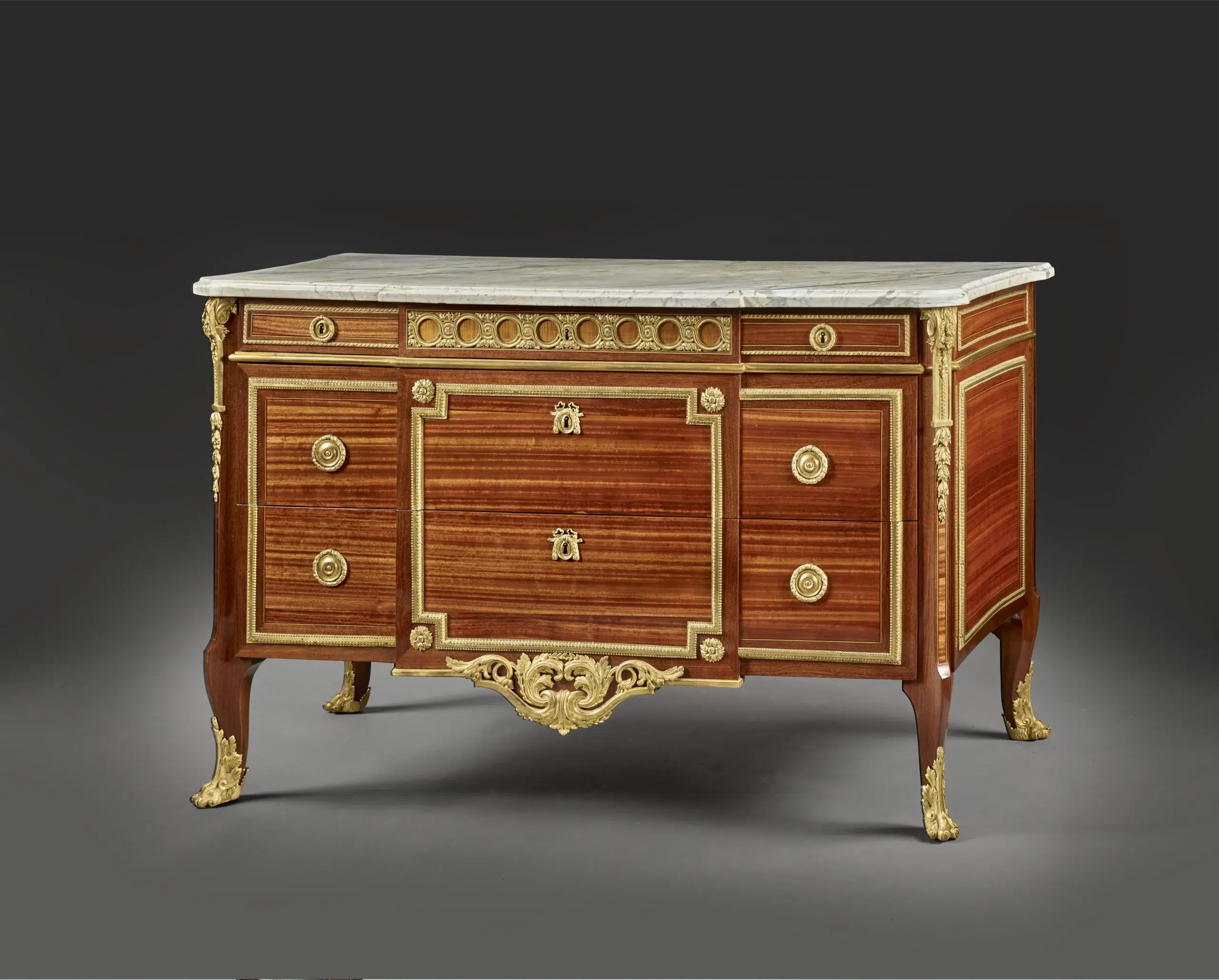France, circa 1770
Stamped J.H. RIESENER
Jean-Henri Riesener (1734−1806)
Satiné, amaranth, chased and gilt bronze
White carara marble top
Provenance :
- Jean-Henri Riesener’s descendants
Close examples:
- Jean-Henri Riesener, Chest of drawers from Louis XVI’s study at the Petit Trianon, 1777, Versailles, Châteaux de Versailles et de Trianon (inv. V 5198)
- Jean-Henri Riesener, Chest of drawers from the library of Louis XVI in Versailles, 1778, Versailles, Châteaux de Versailles et de Trianon (inv. V 5885)
- Jean-Henri Riesener, Chest of drawers delivered for the service of the Children of France at Versailles on April 10, 1779
With a slight retreat, it presents with three drawers in the belt, and lower, two drawers more important. They are adorned with chased and gilt bronzes such as the friezes, with interlacing motif and laurel leaves, the frameworks with water leave and pearls motif, the falls embellished with volutes, acanthus leaves and leaves, rosettes, the handles forming rings of laurel leaves motifs, the ribboned escutcheons, the apron with acanthus leaves motifs, surrounding a cartouche of the same foliage, and the clogs, lion paw-shaped, topped with foliage.
Jean-Henri Riesener (1734−1806)
Born in Gladbeck (Germany), Riesener came to Paris at the age of twenty and was apprenticed to Jean-François Œben, cabinetmaker to King Louis XV, who had his workshops in the Arsenal enclosure. At the latter’s death in 1763, he took over the workshop on behalf of Œben’s widow, whom he married in 1767. Received Master January 23, 1768, he took over the workshop and lodging ofhis master at the Arsenal, where he remained until at least 1798 and achieved the renowned rolltop desk of Louis XV, begun in 1760 and delivered in 1769.
When the cabinetmaker Gilles Joubert retired in 1774, Riesener was appointed ébéniste ordinaire du mobilier de la Couronne, subsequently delivered a considerable amount and a wide range of furniture for the royal family. He worked not only for the Court, but also for the highest circles of the Kingdom: the King’s brothers, the Comte de Provence and the Comte d’Artois, Mesdames, Louis XV’s daughters, the Ducs d’Orléans, de Penthièvre, de La Rochefoucauld, de Biron. He helped decorate the important royal palaces including Versailles, Fontainebleau, Trianon and Marly. In 1784, when Thierry de Ville‑d’Avray became the Intendant du Garde-meuble de la Couronne, he asked Riesener for estimates prior to his orders, which the master refused. He was thus replaced by the marchand mercier Daguerre and Guillaume Benneman, a cabinetmaker. Queen Marie-Antoinette, however, continued to order with Riesener’s workshop, including furniture for the Château de Saint-Cloud.
Bibliography
- Daniel Alcouffe, La folie d’Artois, Paris, Antiquaire à paris, 1988, p. 209.
- Claude Bouzin, Meuble et artisanat, du XIIIe au xviiie siècle, Paris, Éditions de l’amateur, 2003, p. 191–192.
- Daniel Meyer, Le Mobilier de Versailles xviie et xviiie siècles, Tome 1, Dijon, Éditions Faton, 2002, p.72–73.
Measurements:
- Height: 94 cm – 37 inches
- Length: 152 cm – 59 ½ inches
- Depth: 62 cm – 23 ¾ inches
